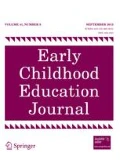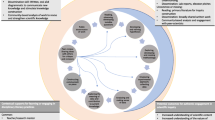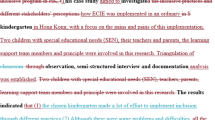Abstract
Expectations for academic writing and publication have intensified in Academia. Doctoral students in colleges of education are advised to publish even before they graduate and evidence of successful publication is influential in hiring, tenure, and promotion decisions. The purpose of this research was to study the process of writing for professional publication from the perspective of a diverse group of 30 doctoral students in colleges of education in the United States, Canada, and Australia. The group ranged in experience from those enrolled in their first doctoral-level courses to students who had very recently defended their dissertations. Interview data from the participants provided strong support for: (1) providing at least one doctoral-level course on writing for professional publication, (2) beginning instruction in scholarly publication earlier and continuing it across all stages of the program, (3) designing class assignments that are better aligned with the expectations for scholarly publication, and (4) providing extensive opportunities for peer and instructor review of manuscripts. From the perspectives of these 30 doctoral students, acquiring the constellation of knowledge, skills, habits, attitudes and values associated with successful publication of scholarly work requires both formal and informal networks of validation and support.
Similar content being viewed by others
References
Badley, G. (2009). Publish and be doctor-rated: The Ph.D. by published work. Quality Assurance in Education: An International Journal, 17(4), 331–342.
Boice, R. (1990). Professors as writers: A self-help guide to productive writing. Stillwater, OK: New Forums Press.
Council of Graduate Schools in the United States. (1977). The doctor of philosophy degree: A policy statement. Washington, DC: Council of Graduate Schools.
Creswell, J. (2012). Qualitative inquiry and research design: Choosing among the five approaches (3rd ed.). Thousand Oaks, CA: Sage.
D’Andrea, L. M. (2002). Obstacles to completion of the doctoral degree in colleges of education: The professors’ perspective. Educational Research Quarterly, 25(3), 42–55.
Dinham, S., & Scott, C. (2001). The experience of disseminating the results of doctoral research. Journal of Further and Higher Education, 25(1), 45–55.
Engestrom, C. M. (1999). Promoting the scholarly writing of female doctoral students in higher education and student affairs programs. National Association of Student Personnel Administrators (NASPA) Journal, 36(4), 264–277.
European University Association. (2005). Doctoral programmes for the European knowledge society: Final report. Brussels: European University Association.
Francis, K., Mills, J., Chapman, Y., & Birks, M. (2009). Doctoral dissertation by publication: Building scholarly capacity whilst advancing new knowledge in the discipline of nursing. International Journal of Doctoral Studies, 4, 97–106.
Hord, S. (1987). Evaluating educational innovation. London: Croom Helm.
Hord, S. M., Stiegelbauer, S. M., Hall, G. E., & George, A. A. (2006). Measuring implementation in schools: Innovation configurations. Austin, TX: Southwest Educational Development Laboratory (SEDL).
Kamler, B. (2008). Rethinking doctoral publication practices: Writing from and beyond the thesis. Studies in Higher Education, 33(3), 283–294.
Kamler, B., & Thomson, P. (2006). Helping doctoral students write: Pedagogies for supervision. New York, NY: Routledge.
Kwan, B. S. C. (2010). An investigation of instruction in research publishing offered in doctoral programs: The Hong Kong case. Higher Education, 59, 55–68.
Lee, A., & Kamler, B. (2008). Bringing pedagogy to doctoral publishing. Teaching in Higher Education, 13(5), 511–523. doi:10.1080/13562510802334723.
Liamputtong, P. (2010). Focus group interview: Principle and practice. Thousand Oaks, CA: Sage.
Lovitts, B. E. (2005). How to grade a dissertation. Academe, 91(6), 18–23.
Lovitts, B. E. (2008). The transition to independent research: Who makes it, who doesn’t, and why. The Journal of Higher Education, 79(3), 296–325.
Luey, B. (2007). Revising your dissertation: Advice from leading editors. Berkeley, CA: University of California Press.
McDougall, D., & Stoilescu, D. (2010). Starting to publish academic research as a doctoral student. International Journal of Doctoral Studies, 5, 79–92. Retrieved from http://go.galegroup.com/ps/i.do?id=GALE%7CA251277852&v=2.1&u=indi68545&it=r&p=AONE&sw=w.
McGrail, M. R., Rickard, C. M., & Jones, R. (2006). Publish or perish: A systematic review of interventions to increase academic publication rates. Higher Education Research and Development, 25(1), 19–35.
Merriam, S. B. (2009). Qualitative research: A guide to design and implementation. San Francisco, CA: Jossey-Bass.
Morris, M. (1998). Publishing perils, and how to survive them: A guide for graduate students. Cultural Studies, 12(4), 498–512.
Nolan, R., & Rocco, T. (2009). Teaching graduate students in the social sciences writing for publication. International Journal of Teaching and Learning in Higher Education, 20(2), 267–273.
NVivo10 (2011). Cambridge, MA: QSR International. [software].
Polayni, M. (1966). The tacit dimension. Garden City, NY: Doubleday.
Rocco, T. S., & Hatcher, T. (2011). The handbook of scholarly writing and publishing. San Francisco, CA: Jossey-Bass.
Sternberg, R. J. (2004). Wisdom and giftedness. In M. Ferrari & L. V. Shavinina (Eds.), Beyond knowledge: Extracognitive aspects of developing high ability (pp. 169–186). Mahwah, NJ: Lawrence Erlbaum Associates.
Swales, J., & Feak, C. (2004). Academic writing for graduate students: Essential tasks and skills (2nd ed.). Ann Arbor, MI: University of Michigan Press.
Vaughn, S., Schumm, J. S., & Sinagub, J. M. (1996). Focus group interviews in education and psychology. Thousand Oaks, CA: Sage.
Author information
Authors and Affiliations
Corresponding author
Appendix
Appendix
Interview Questions
-
(1)
Where scholarly writing and publication are concerned, what do you consider to be an appropriate emphasis during a doctoral students’ program? Why?
-
(2)
Please describe the writing experiences you have acquired thus far in your doctoral studies that have been influential in teaching you the process of scholarly writing and publication.
-
(3)
Do you consider writing to be one of your strengths? Why or why not? If English is your second language, what are the challenges you have faced with academic writing and publishing and how have you attempted to overcome these challenges?
-
(4)
How does a student go about make the transition from class assignments or writing the dissertation to publishing scholarly work in professional outlets?
-
(5)
When you think about submitting your work to anonymous peer review, what prevents you from trying? Conversely, what encourages you to attempt to publish your work?
-
(6)
If you could characterize your feelings about writing for publication in the field of education using a symbol, a metaphor, or a single word, what would it be? Why?
-
(7)
What is the value of published academic writing for you now, as a doctoral student?
-
(8)
After successfully completing your doctoral degree, how do you expect your scholarly writing and publishing to be valued in your future?
Rights and permissions
About this article
Cite this article
Jalongo, M.R., Boyer, W. & Ebbeck, M. Writing for Scholarly Publication as “Tacit Knowledge”: A Qualitative Focus Group Study of Doctoral Students in Education. Early Childhood Educ J 42, 241–250 (2014). https://doi.org/10.1007/s10643-013-0624-3
Published:
Issue Date:
DOI: https://doi.org/10.1007/s10643-013-0624-3




